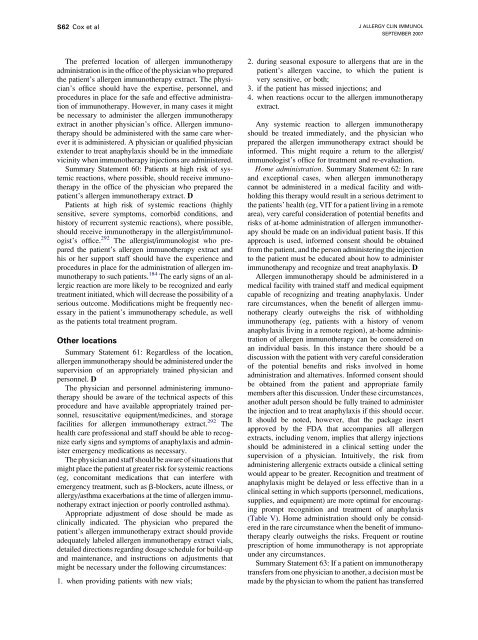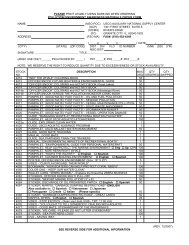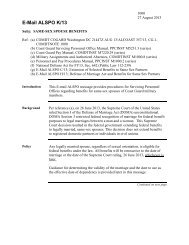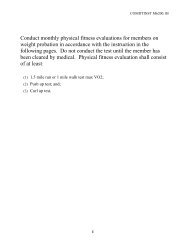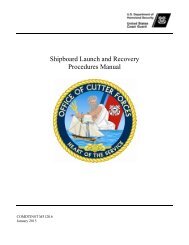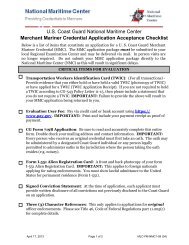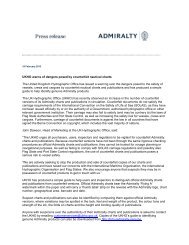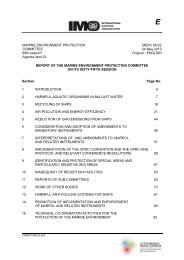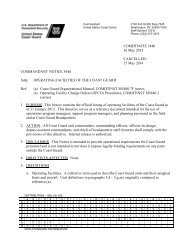Immunotherapy Safety for the Primary Care ... - U.S. Coast Guard
Immunotherapy Safety for the Primary Care ... - U.S. Coast Guard
Immunotherapy Safety for the Primary Care ... - U.S. Coast Guard
You also want an ePaper? Increase the reach of your titles
YUMPU automatically turns print PDFs into web optimized ePapers that Google loves.
S62 Cox et al<br />
J ALLERGY CLIN IMMUNOL<br />
SEPTEMBER 2007<br />
The preferred location of allergen immuno<strong>the</strong>rapy<br />
administration is in <strong>the</strong> office of <strong>the</strong> physician who prepared<br />
<strong>the</strong> patient’s allergen immuno<strong>the</strong>rapy extract. The physician’s<br />
office should have <strong>the</strong> expertise, personnel, and<br />
procedures in place <strong>for</strong> <strong>the</strong> safe and effective administration<br />
of immuno<strong>the</strong>rapy. However, in many cases it might<br />
be necessary to administer <strong>the</strong> allergen immuno<strong>the</strong>rapy<br />
extract in ano<strong>the</strong>r physician’s office. Allergen immuno<strong>the</strong>rapy<br />
should be administered with <strong>the</strong> same care wherever<br />
it is administered. A physician or qualified physician<br />
extender to treat anaphylaxis should be in <strong>the</strong> immediate<br />
vicinity when immuno<strong>the</strong>rapy injections are administered.<br />
Summary Statement 60: Patients at high risk of systemic<br />
reactions, where possible, should receive immuno<strong>the</strong>rapy<br />
in <strong>the</strong> office of <strong>the</strong> physician who prepared <strong>the</strong><br />
patient’s allergen immuno<strong>the</strong>rapy extract. D<br />
Patients at high risk of systemic reactions (highly<br />
sensitive, severe symptoms, comorbid conditions, and<br />
history of recurrent systemic reactions), where possible,<br />
should receive immuno<strong>the</strong>rapy in <strong>the</strong> allergist/immunologist’s<br />
office. 292 The allergist/immunologist who prepared<br />
<strong>the</strong> patient’s allergen immuno<strong>the</strong>rapy extract and<br />
his or her support staff should have <strong>the</strong> experience and<br />
procedures in place <strong>for</strong> <strong>the</strong> administration of allergen immuno<strong>the</strong>rapy<br />
to such patients. 184 The early signs of an allergic<br />
reaction are more likely to be recognized and early<br />
treatment initiated, which will decrease <strong>the</strong> possibility of a<br />
serious outcome. Modifications might be frequently necessary<br />
in <strong>the</strong> patient’s immuno<strong>the</strong>rapy schedule, as well<br />
as <strong>the</strong> patients total treatment program.<br />
O<strong>the</strong>r locations<br />
Summary Statement 61: Regardless of <strong>the</strong> location,<br />
allergen immuno<strong>the</strong>rapy should be administered under <strong>the</strong><br />
supervision of an appropriately trained physician and<br />
personnel. D<br />
The physician and personnel administering immuno<strong>the</strong>rapy<br />
should be aware of <strong>the</strong> technical aspects of this<br />
procedure and have available appropriately trained personnel,<br />
resuscitative equipment/medicines, and storage<br />
facilities <strong>for</strong> allergen immuno<strong>the</strong>rapy extract. 292 The<br />
health care professional and staff should be able to recognize<br />
early signs and symptoms of anaphylaxis and administer<br />
emergency medications as necessary.<br />
The physician and staff should be aware of situations that<br />
might place <strong>the</strong> patient at greater risk <strong>for</strong> systemic reactions<br />
(eg, concomitant medications that can interfere with<br />
emergency treatment, such as b-blockers, acute illness, or<br />
allergy/asthma exacerbations at <strong>the</strong> time of allergen immuno<strong>the</strong>rapy<br />
extract injection or poorly controlled asthma).<br />
Appropriate adjustment of dose should be made as<br />
clinically indicated. The physician who prepared <strong>the</strong><br />
patient’s allergen immuno<strong>the</strong>rapy extract should provide<br />
adequately labeled allergen immuno<strong>the</strong>rapy extract vials,<br />
detailed directions regarding dosage schedule <strong>for</strong> build-up<br />
and maintenance, and instructions on adjustments that<br />
might be necessary under <strong>the</strong> following circumstances:<br />
1. when providing patients with new vials;<br />
2. during seasonal exposure to allergens that are in <strong>the</strong><br />
patient’s allergen vaccine, to which <strong>the</strong> patient is<br />
very sensitive, or both;<br />
3. if <strong>the</strong> patient has missed injections; and<br />
4. when reactions occur to <strong>the</strong> allergen immuno<strong>the</strong>rapy<br />
extract.<br />
Any systemic reaction to allergen immuno<strong>the</strong>rapy<br />
should be treated immediately, and <strong>the</strong> physician who<br />
prepared <strong>the</strong> allergen immuno<strong>the</strong>rapy extract should be<br />
in<strong>for</strong>med. This might require a return to <strong>the</strong> allergist/<br />
immunologist’s office <strong>for</strong> treatment and re-evaluation.<br />
Home administration. Summary Statement 62: In rare<br />
and exceptional cases, when allergen immuno<strong>the</strong>rapy<br />
cannot be administered in a medical facility and withholding<br />
this <strong>the</strong>rapy would result in a serious detriment to<br />
<strong>the</strong> patients’ health (eg, VIT <strong>for</strong> a patient living in a remote<br />
area), very careful consideration of potential benefits and<br />
risks of at-home administration of allergen immuno<strong>the</strong>rapy<br />
should be made on an individual patient basis. If this<br />
approach is used, in<strong>for</strong>med consent should be obtained<br />
from <strong>the</strong> patient, and <strong>the</strong> person administering <strong>the</strong> injection<br />
to <strong>the</strong> patient must be educated about how to administer<br />
immuno<strong>the</strong>rapy and recognize and treat anaphylaxis. D<br />
Allergen immuno<strong>the</strong>rapy should be administered in a<br />
medical facility with trained staff and medical equipment<br />
capable of recognizing and treating anaphylaxis. Under<br />
rare circumstances, when <strong>the</strong> benefit of allergen immuno<strong>the</strong>rapy<br />
clearly outweighs <strong>the</strong> risk of withholding<br />
immuno<strong>the</strong>rapy (eg, patients with a history of venom<br />
anaphylaxis living in a remote region), at-home administration<br />
of allergen immuno<strong>the</strong>rapy can be considered on<br />
an individual basis. In this instance <strong>the</strong>re should be a<br />
discussion with <strong>the</strong> patient with very careful consideration<br />
of <strong>the</strong> potential benefits and risks involved in home<br />
administration and alternatives. In<strong>for</strong>med consent should<br />
be obtained from <strong>the</strong> patient and appropriate family<br />
members after this discussion. Under <strong>the</strong>se circumstances,<br />
ano<strong>the</strong>r adult person should be fully trained to administer<br />
<strong>the</strong> injection and to treat anaphylaxis if this should occur.<br />
It should be noted, however, that <strong>the</strong> package insert<br />
approved by <strong>the</strong> FDA that accompanies all allergen<br />
extracts, including venom, implies that allergy injections<br />
should be administered in a clinical setting under <strong>the</strong><br />
supervision of a physician. Intuitively, <strong>the</strong> risk from<br />
administering allergenic extracts outside a clinical setting<br />
would appear to be greater. Recognition and treatment of<br />
anaphylaxis might be delayed or less effective than in a<br />
clinical setting in which supports (personnel, medications,<br />
supplies, and equipment) are more optimal <strong>for</strong> encouraging<br />
prompt recognition and treatment of anaphylaxis<br />
(Table V). Home administration should only be considered<br />
in <strong>the</strong> rare circumstance when <strong>the</strong> benefit of immuno<strong>the</strong>rapy<br />
clearly outweighs <strong>the</strong> risks. Frequent or routine<br />
prescription of home immuno<strong>the</strong>rapy is not appropriate<br />
under any circumstances.<br />
Summary Statement 63: If a patient on immuno<strong>the</strong>rapy<br />
transfers from one physician to ano<strong>the</strong>r, a decision must be<br />
made by <strong>the</strong> physician to whom <strong>the</strong> patient has transferred


